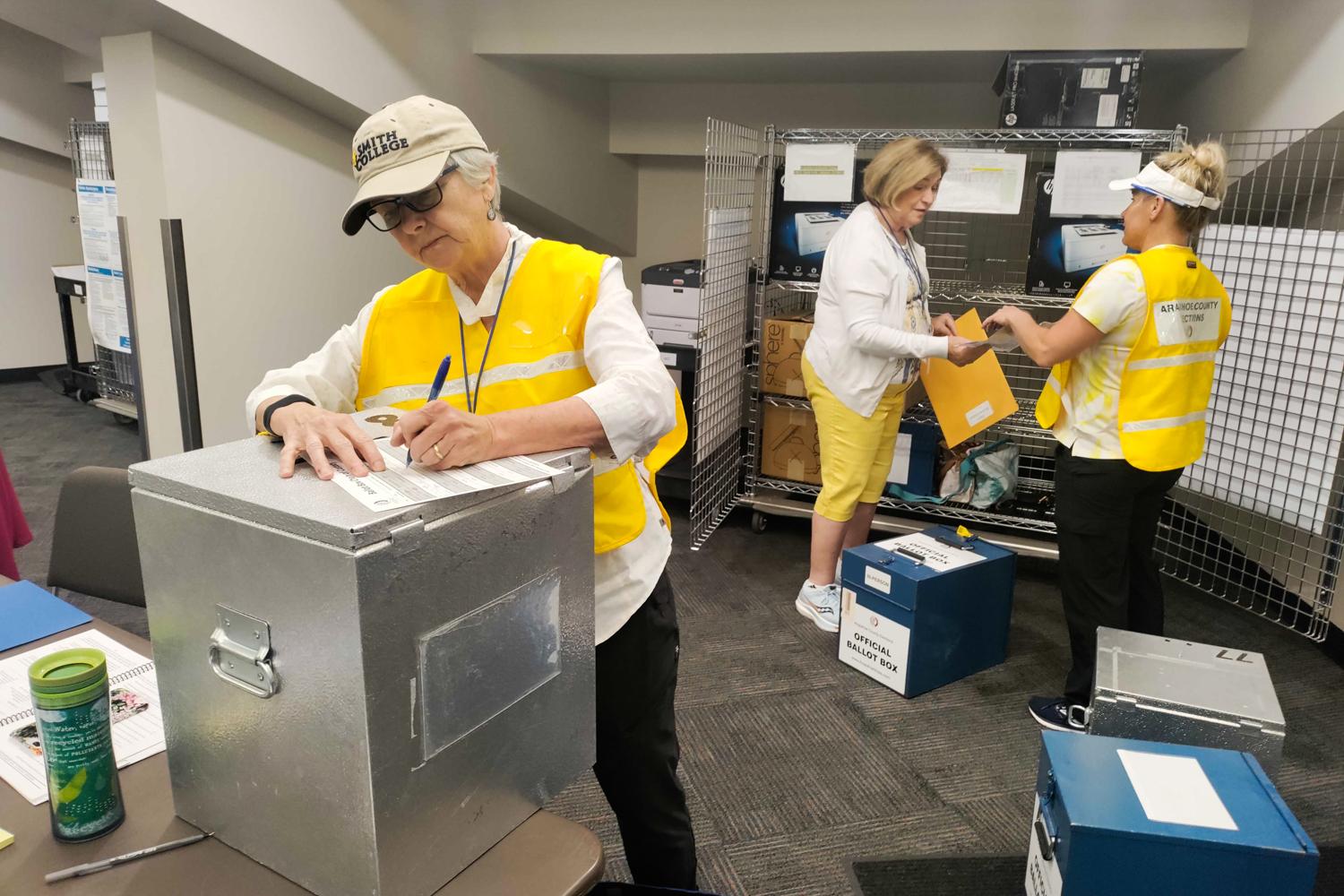
As ballots are mailed to Colorado voters this week, local election officials are combating disinformation about the security and reliability of the state’s voting system and debunking conspiracy theories that could impact voting in this fall’s election.
According to the bipartisan Colorado County Clerks Association, conspiracies are circulating, including one urging people to intentionally make mistakes when filling out their ballots to trigger a hand count of that ballot.
That is false, the ballot would not be counted by hand.
Eagle County clerk, Democrat Regina O’Brien, said the ballot would still be tabulated in the same way, after an additional review, “which is carried out by a bipartisan team of citizen election judges, and is processed through the same exact electronic tabulation equipment as other ballots.”
Another false claim from the right is urging people to vote in person on Election Day, after 3pm.
Matt Crane, the head of the Colorado County Clerks Association and a former Republican clerk in Arapahoe County, says proponents believe voting later would make it harder to stuff a ballot box in favor of non-conservative candidates.
“Which of course is absurd,” Crane said, but the conspiracy theory has gained traction in the wake of Republican Mesa County clerk Tina Peters’ indictment for election tampering and misconduct regarding her county’s Dominion Voting System machines.
O’Brien added, “There's consistently been no evidence of vote tampering, however you define that in Colorado.”
Crane said if people have questions about how the voting process works they should reach out to their county clerk to get those questions answered.
“Rather than following election conspiracies and the lies of election deniers, voters can make a real difference by becoming actively engaged in the election process. We welcome their involvement,” he said.
That’s what happened in Weld County during the primary election. Republican clerk Carly Koppes said she had election poll workers who came in armed with questions and concerns that she addressed one by one.
“I literally had one watcher get on their knees and follow my wires just so that I could prove to them that it is a closed network, that it’s not connected to the internet,” she said.
Election deniers have spread false conspiracies that Dominion’s voting machines are connected to the internet and rigged votes for President Biden
The company is headquartered in Denver and is suing a number of pro Trump media outlets and individuals for defamation.
Unlike past elections, Koppes said many poll watchers who volunteered did so specifically to observe her office.
“I approved 35 watchers during that primary election, and every single one of them had ties to either USEIP (U.S. Election Integrity Plan), which is a known election denier group, or other similar organizations that are also election denier groups as well. This really does put us in a very tough spot,” she said.
USEIP began in Colorado after the 2020 election — and is not associated with any government entity or election office. It’s a door-to-door canvassing effort that went to eight Colorado counties to talk to voters in what they called an attempt to root out alleged fraud in America’s elections. It is also part of a growing national movement by people who believe the lie that the presidential election was stolen.
“It is a concern that these national organizations are recruiting and training individuals to serve as temporary election workers,” said Rachel Orey with the Bipartisan Policy Center Elections Project.
“They are very much at the fringe, and it is a risk to democracy,” said Orey. “But when we talk so much about these fringe threats, I think in some cases we make them seem larger than they are, and we risk reducing voter confidence in an attempt to secure the system.”
According to an FBI report earlier this year, Colorado is among the seven states in which threats to election workers are most prevalent, due to “recounts, audits, or public election disputes.”
Koppes said she wants her office to continue to be open and transparent. She notes that election watchers and judges are always paired with someone from a different political party to ensure bipartisan oversight.
Colorado is also among the states that requires training for election workers, requires them to take an oath of office, and has clear rules for dismissal. The state also passed a new law to increase training and video surveillance of election equipment in an effort to protect against insider election threats.
Still, that hasn’t stopped questions about how elections are conducted or how ballots counted.
“Colorado has more than its fair share of election deniers who have started to export their lies, nationally, which when election officials stand up to push back on that, that's increased threats and intimidation against election officials,” said Crane.








